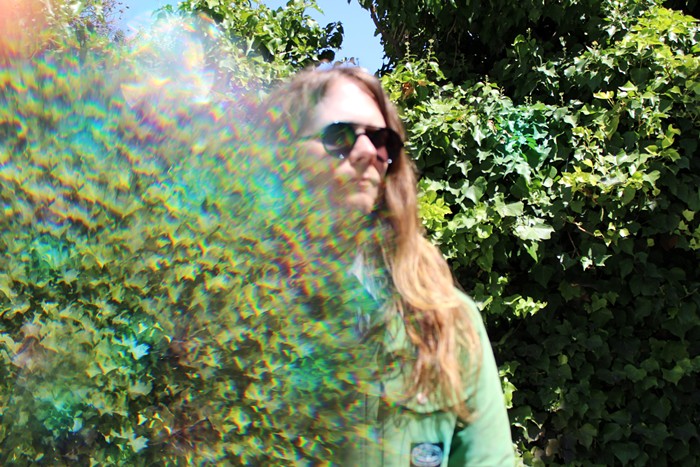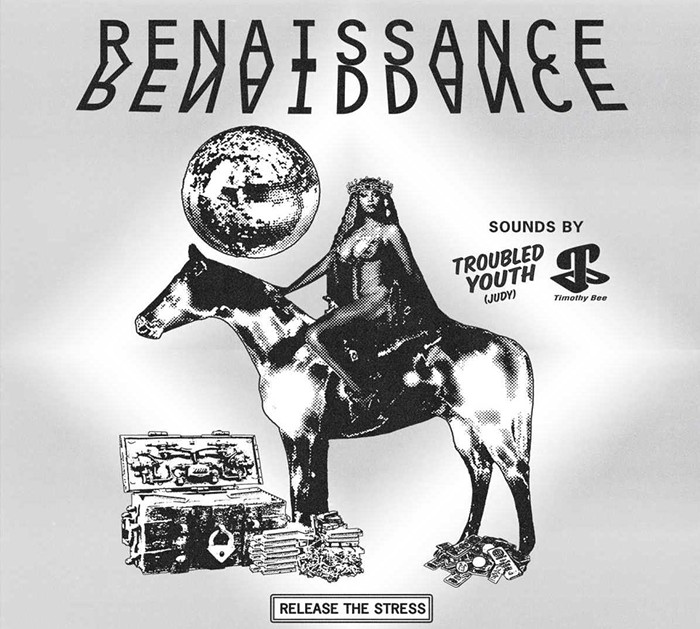THEY WERE IN MOROCCO. Relaxing in a hotel room, the day was relatively calm. The trip, an annual sojourn seeking far-flung music for their label, Sublime Frequencies, was nearing its end. Hisham Mayet buried his head in some writing as label co-founder Alan Bishop surfed through the local radio, cassette recorder in hand.
Through the squelch, Bishop tuned into a song in progress. Both their ears perked up. Bishop hit record. "It was just unbelievable," Mayet says. "We'd never heard anything that unhinged and raw and blasted." The song finished without being identified, but it left an indelible mark.
"We hit the town for the next two weeks asking anybody who would help us who this might be," Mayet says. "Nobody really knew. They just kept saying it was music from the South: 'Hassania music, Sahrawi music.'" Mayet knew the regions, but got nowhere. The trip was coming to a close. Mayet and Bishop returned to the States empty-handed.
"We came home and we just kind of became obsessed," Mayet says. "I went crazy and decided to go back and try to find this group. I started at the very north of the country in Morocco and just went to every city, every village along the coast, playing that recording off the radio."
It was 2005, and by that time these sorts of trips had become familiar. To Mayet, Northern Africa was home. He was born in Tripoli, Libya, to travel-prone parents. Mayet's father, involved in diplomatic circles and international business, took his young son throughout Europe and the Middle East. When Mayet turned seven the family moved to Britain. Four years later they left for America, and currently he resides in Portland.
Along with Alan Bishop and his brother Rick, Mayet began traveling through Africa searching for indigenous sounds and styles. Driven by their own obsessions with music, history, and anthropology, the trio set out simply to feed their own interests. They started conducting field recordings and filmed everything in sight. Only after a well-received 2002 screening in Seattle did Sublime Frequencies become a business.
The label grew slowly but steadily and includes artists from Algeria to China to Vietnam. The styles, ranging from Omar Souleyman's thumping Syrian dance to Group Inerane's searing, Eastern-scaled guitar rock, are as diverse as the world they inhabit. Yet all Sublime Frequencies' releases share a common thread—they are united by a raw, unbridled, soulful energy and an earnest, emotional, regional, and historical purity.
In the last few years the label has emerged as a bona fide tastemaker in the domestic record-collecting market. Sublime Frequencies' stamp of approval is as impactful as almost any critic or other label, and they are largely responsible for African music's renaissance in popular musical culture. This African zeitgeist became readily apparent in the latter half of the aughts, by way of polyrhythm and counterpunctual picking influencing groundbreaking acts such as Animal Collective and Dirty Projectors.
Regardless of popularity or taste, Mayet sees the collection and preservation of these often-ancient ethnic and outsider styles as important in its own right—they catalog much more than they market. As such, he had to find that band they heard on the radio that fateful day in Morocco.
"I kept going south," Mayet says. "After about two weeks of that I was literally in the last town in Western Sahara. I was asking all the cassette shops and they were being kind of elusive. I ended up meeting this shopkeeper. He took me to this studio and I showed up with all my tapes and equipment and got invited in."
Mayet told the man about his search and pulled out the tape. They loaded it in a boombox, the man pressed play, and when the music came on he howled with joy. "He hears that song and looks up at me and says, 'Oh my God! That's my music!'" (The film Palace of the Winds has since chronicled these events.)
The band on the tape was Group Doueh, an atmospheric six-piece that slinks around in deep organic grooves. With a keyboard, guitar, ngoni, a percussion core, and other ethnic instruments, Group Doueh glide from trance-like, sweaty, danceable receptions to smooth, flighty jams as both the group's men and women sing.
The current tour, which will take them across the country and back, is Group Doueh's first in America. And while at times the culture shock can be intense, Group Doueh and the other touring artists with Sublime Frequencies are inspired by the Western push.
"They just want to play music," Mayet explains. "They want people to hear their music. They're also into it for a good time. But all of them love to play and that's what they do for a living—they're professional musicians in their home countries."



















